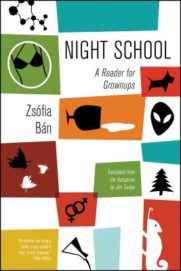 Zsόfia Bán
Zsόfia Bán
translated by Jim Tucker
Open Letter Books ($15.95)
by John Toren
In the age of smartphones and Wikipedia, where a smidgen of semi-reliable information about any and every subject lies at our fingertips, the time has come to entertain a different kind of reference book. That seems to be the reasoning behind the collection of writings the Hungarian novelist Zsόfia Bán's gives us in Night School. The entries are seemingly chosen at random; some are historical, others scientific, while a few explore the meaning of meta-historical concepts concocted by the author herself: a painting by Frida Kahlo, Beethoven's opera Fidelio, an obscure Hungarian geographer named Jenö Cholnocky. Bán makes use of these and other "occasions" to fashion an assortment of imaginative bagatelles, divertimenti, and riffs. They purport to be night school lectures, which may explain both their caustic and insistent tone—"Take your own notes. Observe some things!"—and also their consistently rapid-fire and irreverent narrative thrust.
Such an approach may sound like fun, but the results are mediocre, because the tone soon grows wearisome and the entries are often less interesting than the subjects on which they're obliquely based. Take, for example, the piece titled "The Temptation of Henri Mouhot," a name many readers will be encountering for the first time. Bán paints a portrait of an overweight buffoon concerned about his wife's infidelities back home yet driven by deep-rooted Lutheran pieties to become the first explorer to capture the Great Stinkbug in the jungles of Thailand.
It's caricature, obviously. Yet nowhere in Ban's portrait can she find room to mention that Mouhot's published journals were highly popular in their day, or that a monument was erected in Thailand upon his death bearing the inscription: "We found everywhere the memory of our compatriot who, by the uprightness of his character and his natural benevolence, had acquired the regard and the affection of the natives." No doubt such "facts" reflect the patronizing exaggerations of a colonial age, but the distortions they harbor are far less serious than the trivial fictionalization Bán offers us.
By the same token, "What is This Thing Called the Exchange Reaction" tells us nothing about that basic chemical reaction, in which ions are freely exchanged between molecules without affecting anything much. Instead, she offers us a description of a ping-pong match in which members of opposing sides are attracted to one another during a match:
Our chemistry is good, thought the Captain, but is that enough for happiness? . . . Sometimes friends and old acquaintances meet, and unite in no time at all without altering anything in one another, like wine mixing with water. Yet aren’t wine and water—separately—nobler than a spritzer? . . . Oti and I came together swiftly, without a hitch, like wine and water, and all that came of it was a watered-down spritzer. Net!
The exploration of the parallels between chemistry and emotional life may sound clever, but Bán, dedicated here and elsewhere to a slang-filled first-person monologue, can find nothing of interest to say about her ping-pong players by means of the metaphor. Metaphysical ruminations notwithstanding, the characters involved remain as generic as hydrogen, helium, and carbon.
Among the more interesting entries is one devoted to Henry Wadsworth Longfellow and his second wife, Fanny. The rendering is as full of sarcasm, hyperbole, and caricature as any other, but it also has the merit of introducing us to quite a few little-known details about Longfellow's personality and career. These details aren't reliable—nothing in the book is—but they pique our desire to find out more about the personal life of that nineteenth-century bard.
Ever better is an imagined monologue delivered by the painter Eduard Manet regarding the intense and pitiless stare of his model Victorine, and how it has both inspired his work and ruined his career. The piece reads almost like a Bob Newhart comedy routine from the 1960s, yet here, for once, Bán doesn't dumb down the subject matter in the interests of cheap irony.
The richest entry of all is "Expulsion to Paradise." It takes us deep into the sights, and even more, the smells of Brazil, during an insistent tour of the region's mystical and mythic geography:
You look around, check that the boardwalk is still there on the shore, that Christ is still around, and the bay, the sunset—check, check, every¬thing is still there. Oh come on, don’t be a dodo. You have to sniff things first, smell the odor of rotting time, the typical scabby stench of the past rising from the trash cans, spreading over the city, the smell of the sewers overmatched by tropical storms, the hillsides that ring the town, the smell of poverty drifting from the favelas toward the sea and, while we’re on the subject, the sea’s own smell, all used up, sniffed to death.
The author, who was partly raised in Brazil, seems to be tapping into a more personal and authentic strata of her experience here, and the result, dark and distinctly poetic, stands in marked contrast to the bulk of the book, which is full of flippant narrative and chattering erudition but largely devoid of warmth or genuine interest.
